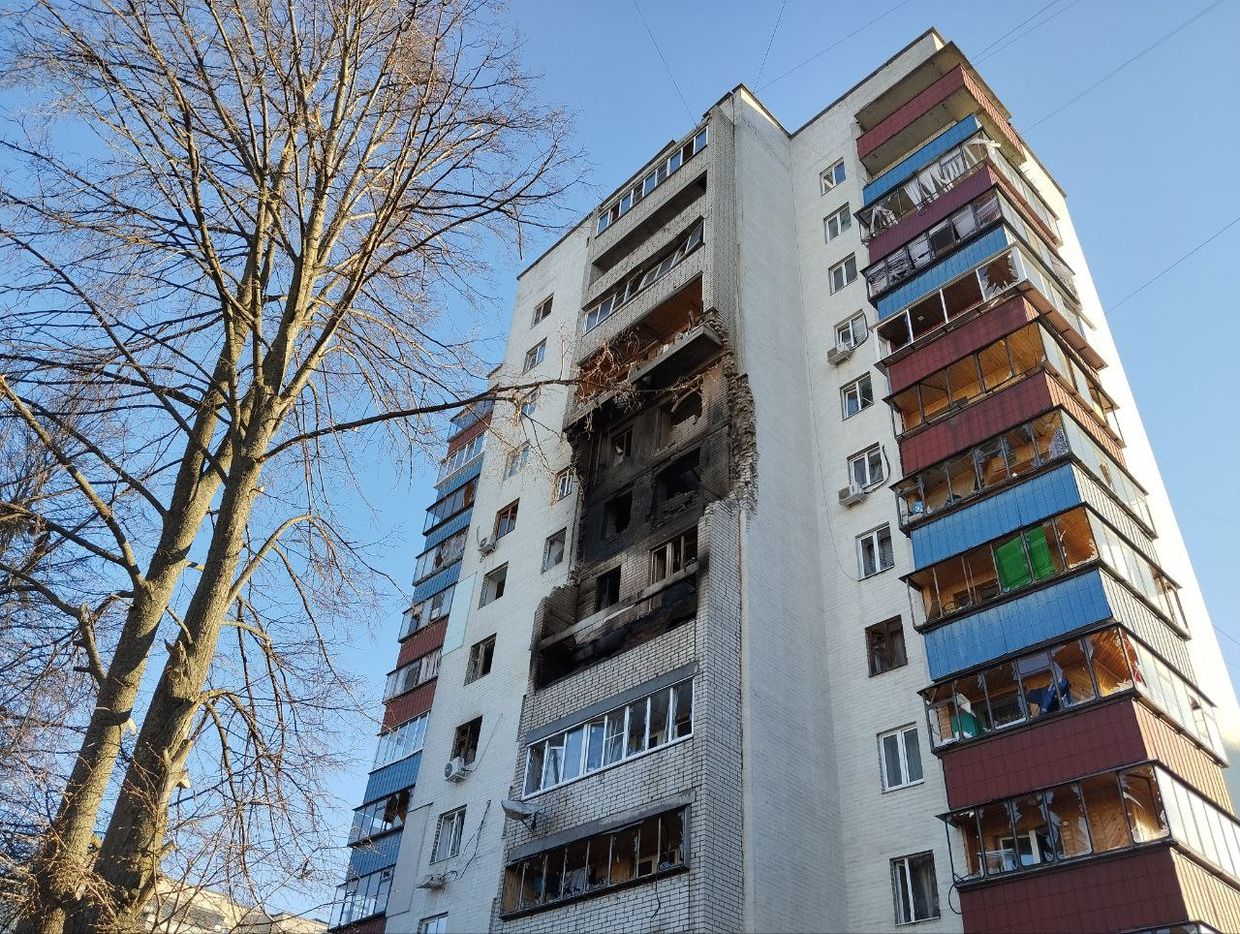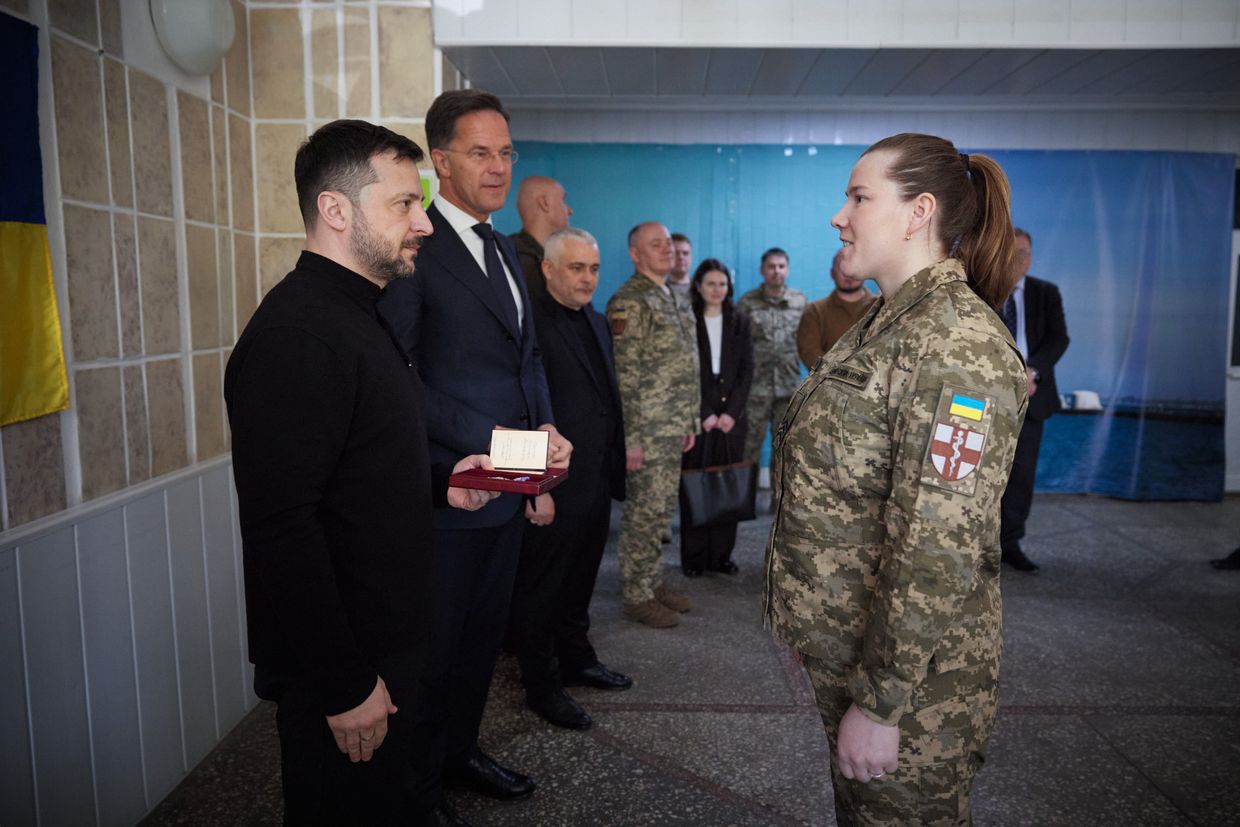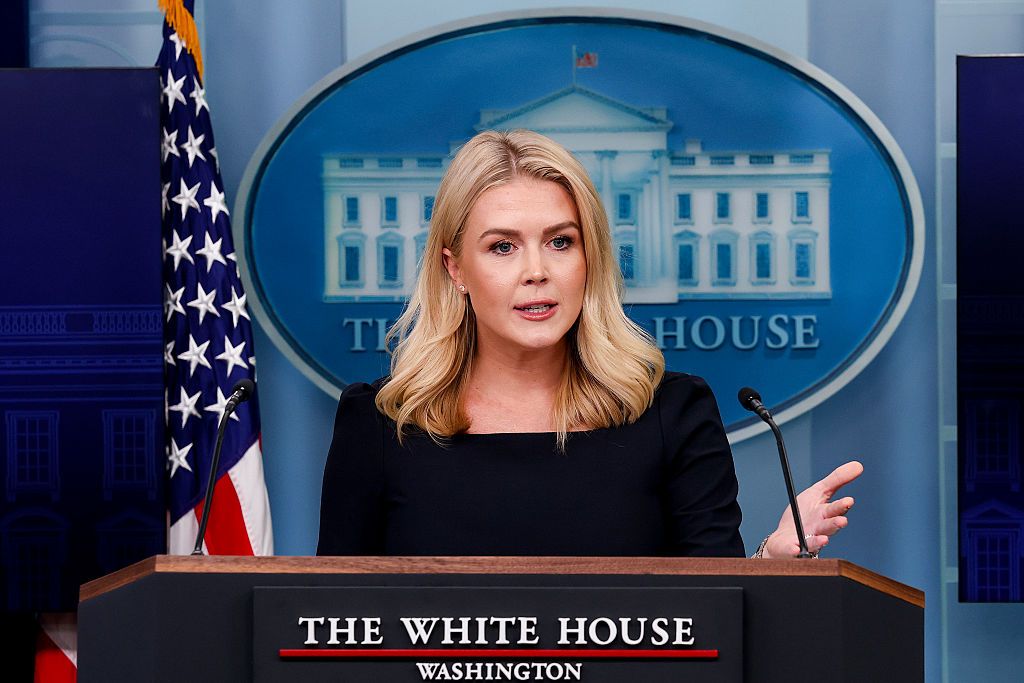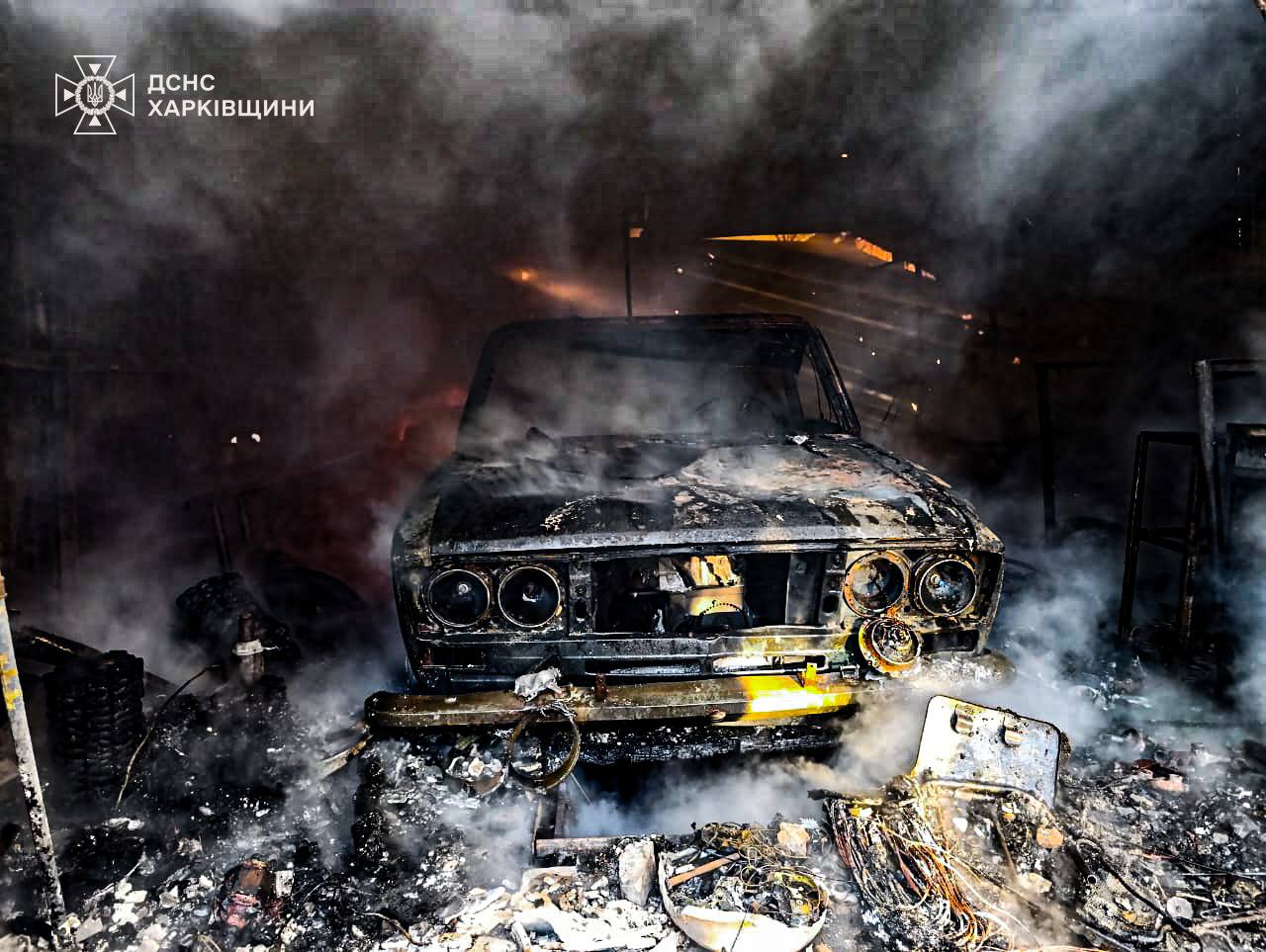SAs Ukraine Targets Russian Missile Brigade and Reforms Military Structure, NATO’s Rutte Visits Odesa
Summary of the Day – April 15, 2025
Ukraine dismissed Sumy and Luhansk governors while striking the Russian 448th Missile Brigade responsible for Sunday’s deadly Sumy attack. The military announced formation of two new army corps as Ukrainian forces gained ground near Toretsk and reclaimed Dniproenerhiia village, while Russian forces advanced near Velyka Novosilka and in western Zaporizhzhia. NATO’s Rutte visited Odesa, pledging continued support as Russia’s intelligence chief Naryshkin threatened Poland and Baltic states. Meanwhile, U.S. Vice President Vance rejected Zelensky’s criticism as the Trump administration reportedly plans major NATO funding cuts.

Mourners embrace at the funeral of musician Olena Kohut in Sumy on. Kohut was killed in a Russian missile attack against the city center. (Nina Liashonok / Ukrinform / NurPhoto via Getty Images)
Swift Retribution: Ukraine Strikes Russian Brigade Behind Sumy Attack
Ukrainian forces struck the base of Russia’s 448th Missile Brigade, which carried out the deadly attack on Sumy that killed 35 people and injured 119 on April 13, Ukraine’s General Staff reported on April 15. The strike on the Russian base in Kursk Oblast was carried out by Ukraine’s Unmanned Systems Forces, Special Operations Forces, the Security Service of Ukraine, and other military units. According to Ukrainian officials, the attack triggered an ammunition explosion at the site.

The aftermath of a reported drone attack in Kursk, Russia. (Kursk Oblast Operational Headquarters/Telegram)
“Every Russian military unit, subdivision, and their servicemen who shell peaceful cities and civilians in Ukraine will be identified and will definitely receive retribution,” the General Staff’s statement read. The full consequences of the strike are still being assessed.
Political Fallout: Ukrainian Governors Dismissed
The Ukrainian government approved the dismissal of Volodymyr Artiukh as Sumy Oblast governor and Artem Lysohor as Luhansk Oblast governor on April 15. Artiukh’s dismissal comes amid accusations that he had planned a military awards ceremony in Sumy on the day of the deadly Russian missile attack. Artiukh confirmed plans for the event but denied responsibility for initiating it.
Konotop Mayor Artem Semenikhin had accused Artiukh of organizing the ceremony, arguing this posed an undue risk to civilian residents. Members of the Sumy Regional Administration Council submitted a motion of no-confidence against the governor on April 14. Oleksii Kharchenko will take over as the Luhansk Oblast governor, and Oleh Hryhorov was appointed governor of Sumy Oblast.
Military Restructuring: Ukraine Forms Two New Army Corps
Ukraine’s National Guard announced on April 15 the formation of two new army corps on the basis of two existing brigades, amid Ukraine’s continued efforts to transition to a corps structure. The 1st “Azov” Corps of the National Guard will consist of four existing brigades and one new brigade, according to the announcement. Ukraine has yet to reveal details about the second new corps.
Chief of the Ukrainian General Staff Major General Andriy Hnatov stated on April 15 that the Ukrainian military is staffing new corps with commanders who have combat experience and that corps will become the main component for conducting operations. The formation of an echelon between Ukraine’s brigades and operational groups of forces, and strengthening the army corps staff structure will likely improve Ukrainian command and control.
Battlefield Developments: Territorial Gains and Losses
Ukrainian forces have recaptured the village of Dniproenerhiia in Donetsk Oblast’s Volnovakha district and advanced in two key front-line sectors in the past two months, Lieutenant General Serhii Naiev, commander of the Vuhledar tactical group, reported on April 15. Dniproenerhiia, located along the Mokri Yaly River in the Komar community, lies 35 kilometers northwest of occupied Vuhledar.
Geolocated footage published on April 15 indicates that Ukrainian forces recently marginally advanced in northwestern Toretsk. Meanwhile, Russian forces recently advanced in the Velyka Novosilka direction during a large-scale mechanized assault and along the T-0812 Orikhiv-Zaporizhzhia City highway east of Shcherbaky in western Zaporizhzhia Oblast, as confirmed by geolocated footage from April 14-15.
Fighting continued in northwesternmost Belgorod Oblast on April 15, but Russian forces did not make confirmed advances. Russian forces also continued offensive operations in the Sumy direction, the Kupyansk direction, the Borova direction, the Lyman direction, the Siversk direction, the Chasiv Yar direction, and the Kurakhove direction on April 15, but did not make confirmed advances.
NATO’s Reassurance: Rutte Visits Odesa, Pledges Continued Support
NATO Secretary General Mark Rutte arrived in Odesa on April 15 and visited a local military hospital alongside Ukrainian President Volodymyr Zelensky. During the hospital visit, Rutte and Zelensky awarded state honors to Ukrainian service members before holding a joint press conference.

NATO Secretary General Mark Rutte and President Volodymyr Zelensky visited the military hospital in Odesa and presented state awards to Ukrainian military.
Rutte emphasized NATO’s unwavering support for Ukraine, stating that the alliance continues to provide critical assistance. In the first three months of 2025, NATO partners have contributed more than 20 billion euros to aid Ukraine, he said.
“We are talking about a long period afterward because we have to understand that a truce is good, but the Armed Forces of Ukraine are the first line of defense, which should always stand on the border of Ukraine. And these initiatives are ongoing,” he said during the press conference.
Rutte mentioned that France and the UK are forming a coalition to support Ukraine by providing advice on developing security strategies. He also stressed that NATO is considering the experience of the 2014 Minsk agreements, which proved ineffective in preventing Russian aggression.
Moscow’s Threats: SVR Director Warns Poland and Baltic States
Poland and the Baltic states would be the “first to suffer” in a direct conflict between NATO and Russia, Russia’s Foreign Intelligence Service (SVR) Director Sergey Naryshkin said on April 15. “They should understand, but do not yet understand, that in the event of aggression by the North Atlantic Alliance against Russia and Belarus, damage will be done, of course, to the entire NATO bloc, but to a greater extent, the first to suffer will be the bearers of such ideas among the political circles of Poland and the Baltic countries,” Naryshkin told Russian state news outlet TASS.
These countries have shown “high aggressiveness” towards Russia, he said, accusing Poland and the Baltics of “constantly rattling their weapons.” Naryshkin singled out Poland for its plans to install anti-personnel mines along the border with Belarus and Russia’s heavily militarized Kaliningrad exclave, as well as Warsaw’s request for the U.S. to deploy nuclear weapons in Poland.
Naryshkin threatened a Russian attack against NATO states in response to NATO states building up their defenses in line with U.S. President Donald Trump’s push for Europe to increase its own defense capabilities. The SVR chief claimed that European states, such as France, the UK, and Germany, are escalating the war in Ukraine, so Russia “needs to act preemptively” and “is ready for this.”
U.S.-Ukraine Relations: Vance Responds to Zelensky, Trump Rejects Patriot Request
U.S. Vice President JD Vance on April 15 pushed back against criticism from President Volodymyr Zelensky, saying it was “absurd” to accuse Washington of siding with Russia. “I think it’s sort of absurd for Zelensky to tell the (American) government, which is currently keeping his entire government and war effort together, that we are somehow on the side of the Russians,” Vance said.
The remarks followed an interview with CBS News, in which Zelensky condemned Vance for echoing Kremlin rhetoric and accused the U.S. vice president of trying to justify Russia’s invasion of Ukraine.
Meanwhile, U.S. President Donald Trump on April 15 dismissed President Zelensky’s request to buy Patriot air defense systems, accusing him of “always looking to purchase missiles” while falsely blaming Kyiv for instigating the war with Russia. “You don’t start a war against someone 20 times your size and then hope that people give you some missiles,” Trump said during a White House meeting.
The comments followed Zelensky’s interview with CBS News, in which he offered to buy 10 U.S.-made Patriot systems — worth $1.5 billion each — to shield Ukrainian cities from relentless Russian missile and drone strikes.
America First: White House Plans to Defund NATO and UN
The Trump White House is proposing dramatic cuts to the U.S. State Department’s budget, including halting nearly all of the department’s funding to NATO, the U.N., and over 20 other international organizations, the Washington Post reported on April 15, citing an internal draft document.
The proposed cuts for the next fiscal year would reportedly leave $28.4 billion for all State Department activities, a 48% reduction from the 2025 budget approved by Congress. The plan would preserve only minimal support for a handful of agencies, such as the International Atomic Energy Agency and the International Civil Aviation Organization.
According to Politico, funding for “contributions to international organizations,” presumably including U.N. institutions, would be slashed from $1.5 billion to $169 million. Although the proposal would require congressional approval, the cuts align with broader White House efforts to slash federal spending.
Russia’s Military and Legal Measures: Reduced Payments and First Surrender Conviction
The Yamalo-Nenets Autonomous Okrug has become the first Russian region to reduce enlistment payments for soldiers fighting in Ukraine, the Moscow Times reported on April 15. Instead of the previously offered 3.1 million rubles (about $37,700), new recruits will receive 1.9 million rubles (roughly $23,100). The higher payment had been in effect from Jan. 20 through April 15.
The highest bonus in Russia is still offered in Samara Oblast, where officers and those renewing contracts with the Russian Defense Ministry can receive 3.6 million rubles ($43,800). As of late March, the Russian government was spending about 2 billion rubles ($24.3 million) per day on enlistment bonuses, according to the Russian Finance Ministry.
A Russian court has sentenced Roman Ivanishin, a soldier from Sakhalin, to 15 years in a maximum security prison for surrendering to Ukrainian forces, Russian pro-state media outlet Kommersant reported on April 15. The case marks the first known conviction in Russia for voluntary surrender during the full-scale war against Ukraine.
Ivanishin, who served in the 39th Separate Guards Motorized Rifle Brigade deployed in Ukraine’s Donetsk Oblast, was captured by Ukrainian troops near the village of Stepne on June 10, 2023. The soldier was released in January 2024 as part of a prisoner exchange involving 248 Russian service members. Upon his return, Russian authorities detained and charged Ivanishin with voluntary surrender, an additional attempt to surrender, and desertion.
Diplomatic Developments: Slovak PM to Attend Moscow Celebrations
Slovak Prime Minister Robert Fico will attend Russia’s military celebrations in Moscow on May 9, despite EU High Representative Kaja Kallas’ warnings to European leaders, Fico announced on April 15. “I am going to Moscow on May 9,” Fico wrote in a Facebook post.
Kallas earlier in the day urged European leaders to boycott the event in solidarity with Ukraine. Participation in the Moscow celebrations “will not be taken lightly on the European side, considering that Russia is really waging a full-scale war in Europe,” she said.
In his post, Fico addressed Kallas’ warning directly and insisted he had the right to visit Moscow. “Ms. Kallas, I would like to inform you that I am the legitimate Prime Minister of Slovakia — a sovereign country,” he wrote. “No one can tell me where I should or should not travel. I will go to Moscow to pay my respects to the thousands of Red Army soldiers who died liberating the Slovak Republic.”
EU’s Russia Strategy: Sanctions Adaptation
EU legal experts are exploring a potential method of preventing Hungary from derailing the extension of sanctions imposed on Russia this July, Radio Free Europe/Radio Liberty reported on April 15. One of the main options Brussels has for bypassing Hungary’s veto is to leave the sanctions in effect without the formal extension.
The EU sanctions consist of two documents adopted one after another: a decision and a regulation. While a regulation must be extended by all 27 members every six months, a decision remains in force until a qualified majority repeals it. This would mean that the already-imposed decision on sanctions would remain in force without the need for extension.
Poland and Czechia are spearheading efforts to restrict the free movement of Russian diplomats within the Schengen Area, citing concerns over espionage and sabotage, Polish media Rzeczpospolita reported on April 15. The proposal calls for limiting Russian diplomats to their consular districts, a restriction already implemented in Poland. Currently, 21 Russian diplomats remain in the country — a third of the pre-2022 number — confined to Warsaw, Gdansk, and Krakow.
North Korea’s Role: Majority of Russia’s Artillery Now North Korean-Made
The majority of artillery shells used by Russian forces in Ukraine in 2025 were manufactured in North Korea, according to a joint investigation by Reuters and the Open Source Center released on April 15. Internal technical reports from Russia’s Defense Ministry indicate that in some Russian military units, between 75% and 100% of artillery shells are North Korean-made. Overall, North Korea is providing roughly half of all artillery shells used by Russian troops, according to Ukraine’s military intelligence agency (HUR).
Arms shipments from North Korea to Russia began no later than September 2023, following a July visit to Pyongyang by then-Russian Defense Minister Sergei Shoigu. Between September 2023 and March 17, 2025, Russian cargo ships transported military cargo 64 times from the North Korean port of Rajin to the Russian ports of Danube and Vostochny, carrying at least 15,809 containers in total.
Russia’s Next-Gen Indoctrination: Komsomol Revival
The Russian government is planning to open a political education workshop for youth that will be analogous to the Soviet-era Higher Komsomol School, which indoctrinated young Communist Party members, the Russian pro-state news agency RBK reported on April 15.
Russia will launch a new program called the Digoria Political Education Workshop to train personnel who work with youth, a source in the Kremlin told RBK. The source likened the program directly to the Higher Komsomol School: “It will be its modern analog for young specialists in the socio-political sphere and youth policy administrators,” he said.
Participants “will receive both ideological training and special knowledge on the management of youth organizations and participation in political processes.” Russia’s state Youth Affairs Agency, Rosmolodezh, is expected to be the school’s primary customer. By the end of the year, the school aims to conduct 12-13 educational programs for 100 people per course.
Peace Talks: Kremlin, White House Signal Economic Incentives
The Kremlin sees no “clear outlines” of an agreement with the United States on the war in Ukraine, Kremlin spokesperson Dmitry Peskov said on April 15, according to Russian state news agency TASS. Peskov’s remarks follow a meeting between U.S. Special Envoy Steve Witkoff and Russian President Vladimir Putin in St. Petersburg on April 11.
Peskov called the recent talks “positive and useful.” “We are very, very positive about the constructive and meaningful contacts that have taken place,” Peskov said, adding that both parties have the political will to reach an agreement. “I would like to hope for the best that this work will have positive results. At this point, we wouldn’t be able to say for sure about any timeframe,” he said.
Economic partnerships with the United States could provide Russia with an incentive to end the full-scale war against Ukraine, White House Press Secretary Karoline Leavitt said at a briefing on April 15. “(Witkoff) believes that Russia wants to end this war and the president believes that as well,” she said. “There is an incentive for Russia to end this war and perhaps that could be economic partnerships with the United States. But we need to see a ceasefire first and the president and the presidential envoy, Witkoff, made that very clear to the Russians.”

White House Press Secretary Karoline Leavitt speaks during a daily press briefing at the White House in Washington, DC. (Win McNamee/Getty Images)
Russia may recognize the end of the 30-day energy infrastructure strikes ceasefire soon and intensify its long-range strikes against Ukraine, but the exact parameters of the ceasefire — including its end date — remain unclear. Kremlin Spokesperson Dmitry Peskov claimed on April 15 that the Kremlin would clarify the end date of the 30-day energy infrastructure strikes ceasefire with the Russian MoD and noted that “everything will depend on further orders from the Supreme Commander-in-Chief [Putin].”
Civilian Casualties: Russian Attacks Continue Across Ukraine
Russian attacks across Ukrainian regions killed at least six civilians and injured at least 17, including a child, over the past day, regional authorities reported on April 15. A 78-year-old woman was injured during Russian drone attacks against the Nikopol district of Dnipropetrovsk Oblast, Governor Serhii Lysak reported.
In Donetsk Oblast, one person was killed and another injured in Russian attacks on Pokrovsk, according to Governor Vadym Filashkin. Three more injuries in total were reported in Stepanivka, Lyman, and Krasnyi Lyman.
Four people were killed and three injured in Russian attacks across Kharkiv Oblast, said Governor Oleh Syniehubov. In Kherson Oblast, eight people were injured, including a child, Governor Oleksandr Prokudin said. Three high-rise buildings and 21 houses were damaged.
One civilian was injured during Russian attacks against the Myropillia community in Sumy Oblast, the regional military administration reported. A 63-year-old man was killed during a Russian attack against the Zaporizhzhia district, Governor Ivan Fedorov said.

A car burning following Russian attacks against Kharkiv Oblast, Ukraine. (State Emergency Service/Telegram)
International Support: Revised Aid Figures Show European Leadership
Total assistance allocated by Europe to Ukraine since 2022 stands at 138 billion euros ($157 billion), 23 billion euros ($26 billion) more than the U.S., according to an April 15 report by the Kiel Institute for the World Economy’s Ukraine Aid Tracker.
The U.S. still holds an edge in terms of military aid — its 65 billion euros ($74 billion) total leads Europe by 1 billion euros ($1.1 billion) — but the gap is narrowing, as Washington has not allocated a new aid package since January 9.
“The recent pause in U.S. aid raises the pressure on European governments to do more, both in financial and military assistance,” Taro Nishikawa, project lead of the Ukraine Support Tracker at the Kiel Institute, said in a statement.
European Phase-Out: EU Energy Commission Plan Deadline Set
The European Commission will present by May 6 a roadmap detailing how the EU will phase out Russian fossil fuel imports, Reuters reported on April 15. The strategy, originally scheduled for release last month, was postponed amid growing uncertainty over U.S. President Donald Trump’s new tariff policies, which could affect energy trade.
The European Union committed in 2022 to ending Russian fossil fuel imports by 2027 in response to Moscow’s full-scale invasion of Ukraine. Despite cutting pipeline gas deliveries from Russia, the bloc continues to rely on Russian liquefied natural gas (LNG), which made up 19% of total EU gas and LNG supplies in 2024.
Swedish Diplomatic Response: Russian Ambassador Summoned
Sweden summoned the Russian ambassador to its foreign ministry on April 15 to protest against Moscow’s attacks on civilian populations. “Russia’s responsibility to protect civilians and civilian infrastructure in accordance with international humanitarian law was emphasized to the Russian ambassador during his appearance,” the Swedish foreign ministry said.
Stockholm summoned Russian ambassador Sergey Belyaev, explaining that it had to “take a clear stance against Russia’s continuous attacks against Ukraine’s cities and civilian population and the serious attacks against the cities of Sumy and Kryvyi Rih in recent weeks,” the ministry’s statement said.
“These are not the acts of a country that seeks peace,” Swedish Foreign Minister Maria Malmer Stenergard posted on social media. “The Swedish government calls on Russia to immediately withdraw all its troops from Ukrainian territory. The Swedish government wants to see a just and lasting peace in Ukraine and will support Ukraine as long as it takes,” she wrote.
German Military Aid: Taurus Missiles Could Be Supplied Under New Coalition
A joint decision with Germany’s Social Democrats (SPD) on supplying long-range Taurus missiles to Ukraine is increasingly possible, Johann Wadephul, deputy head of the CDU/CSU parliamentary group, told Tagesschau on April 15.
“The Social Democrats also know — not least since the renewed Russian war crimes in Sumy — that (Russian President Vladimir) Putin must be dealt with differently,” said Wadephul, referring to Russia’s April 13 missile strike that killed at least 35 civilians.
The statement follows remarks by chancellor-in-waiting and CDU head Friedrich Merz, who on April 13 reiterated his position that Germany could supply Taurus missiles to Ukraine in coordination with partners. “Merz has confirmed his willingness to use Taurus as a lever to change Russia’s policy,” Wadephul added, calling it “an important signal.”
Congressional Support: Democrats Draft Ukraine Aid Bill
Democratic members of the U.S. Congress have drafted a bill to ramp up support for Ukraine and impose tougher sanctions on Russia, Reuters reported on April 15, citing congressional sources.
The legislation, co-authored by Rep. Greg Meeks of the House Foreign Affairs Committee, proposes expanded security assistance for Ukraine, including direct loans, military financing, and support for reconstruction efforts. It also calls for the appointment of a special coordinator to oversee Ukraine’s recovery.
The bill targets Russia with stricter sanctions and export controls, particularly against its financial institutions and oil and mining sectors. Though not yet formally introduced in the House of Representatives, the proposal is seen as an effort to pressure President Donald Trump’s administration to adopt a more decisive stance in support of Ukraine.
Martial Law Extension: Zelensky Submits Bills to Parliament
President Volodymyr Zelensky submitted two bills to Ukraine’s parliament, the Verkhovna Rada, on April 15 to extend martial law and general mobilization in the country. The bills are set to expire on May 9 and await the Verkhovna Rada’s approval to be effective.
Ukraine introduced martial law on Feb. 24, 2022, when Russia launched a full-scale invasion of Ukraine, which has since been extended 14 times, each time by 90 days. Ukraine also announced a general mobilization for the first time in modern Ukrainian history when the 2022 invasion broke out.
Business Support: Ukrainian Companies Rally After Russian Strike
Ukraine’s largest marketplace, Rozetka, announced on April 15 that it will direct all sales revenue from Biosphere products to reconstruction of Biosphere’s warehouse — which was destroyed by a Russian missile strike in the eastern Ukrainian city of Dnipro on April 10.
The initiative will last until May 10, Rozetka said. “We are uniting to help: 100% of the profit from all Biosphere goods on Rozetka will be directed toward rebuilding the company’s warehouses,” it wrote.
Russia’s missile strike, which apparently targeted Biosphere infrastructure, killed one 42-year-old employee and injured nearly a dozen others. Biosphere is one of Ukraine’s biggest companies, producing diapers, wipes, and other civilian products. According to Forbes Ukraine, its revenue in 2024 increased by a third to Hr.7.5 billion ($181.1 billion).
